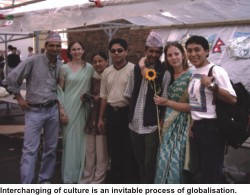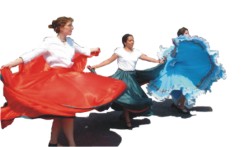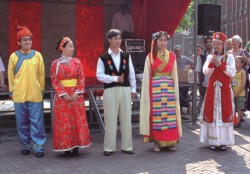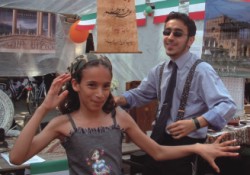|
Trends
What's
brewing in the "Melting Pot"?
The Dilemma of Global Cultrue
Imran H. Khan
 Culture
is the learned, shared and transmitted information or facts
from one generation to the next. It is the behaviour, learned
and practiced, that defines and distinguishes one society
from another. Culture gives individuals an anchoring point,
a sense of belonging and thus, an identity. This identity
demands adherence to certain rules of conduct. But what happens
when the barriers are broken; when there are no boundaries
between two cultures and when people are faced with the question:
where do we belong? Debates may shuttle among economists,
administrators and the academia but it is the ordinary people,
the men and women in the streets who are experiencing and
metamorphosing the effects of globalisation. Culture
is the learned, shared and transmitted information or facts
from one generation to the next. It is the behaviour, learned
and practiced, that defines and distinguishes one society
from another. Culture gives individuals an anchoring point,
a sense of belonging and thus, an identity. This identity
demands adherence to certain rules of conduct. But what happens
when the barriers are broken; when there are no boundaries
between two cultures and when people are faced with the question:
where do we belong? Debates may shuttle among economists,
administrators and the academia but it is the ordinary people,
the men and women in the streets who are experiencing and
metamorphosing the effects of globalisation.
For
the consumer the local markets are bursting with cars, cosmetics
and confectionery among numerous other goods. Almost everything
that is produced in one country can be made available to another
country, even in another continent. The transfer of human
capital is also on the rise. The driving power behind all
this seems to be 'cable television'. It is not restricted
to urban dwellers but penetrates the community centres of
the deepest rural areas. Not only are we seeing what other
cultures are like, we are also seeing how they behave, how
they dress, what they eat and what they do.
 Celebrities
have always been role models, if not with their life styles,
at least their hairstyles and wardrobe. In the past many fashion
conscious people looked westwards for fashion but their sights
were set nearer home. Now they've been teleported much further
west and hair styles of Julia Roberts, Jennifer Aniston and
David Beckham are turning up in the elite circles of Dhaka
society. Not to be outdone, tokais in the little
alleys of Dhaka and other little street urchins can be seen
singing tunes from Michael Jackson's songs and emulating 'moonwalks'. Celebrities
have always been role models, if not with their life styles,
at least their hairstyles and wardrobe. In the past many fashion
conscious people looked westwards for fashion but their sights
were set nearer home. Now they've been teleported much further
west and hair styles of Julia Roberts, Jennifer Aniston and
David Beckham are turning up in the elite circles of Dhaka
society. Not to be outdone, tokais in the little
alleys of Dhaka and other little street urchins can be seen
singing tunes from Michael Jackson's songs and emulating 'moonwalks'.
It
is not just monkeys who fit the adage "Monkey see monkey
do." Put people in their place and we act likewise. But,
unlike monkeys, we have the ability to mutate the concepts
or ideas and adapt them into our own. A clear example of this
is in the world of fashion, where the mundane and lowly <>fatua
has leaped to the heights of fashion. It has lost its gender
restriction and young boys and girls (and sometimes even their
parents...) can be seen flaunting multicoloured, tie-dyed,
printed, painted (and at times pulverized) fatuas
on top of jeans or pants. The ultimate is the fatua
made out of the rainbow coloured gamcha, thanks to
Bibi Russell. Someone was heard to remark the other day that
they saw a foreign fashion show where all the models had gamchas
wound around their head. Our farmers and rickshaw drivers
can now be seen as trendsetters and the pioneers of this fashion.
There were times, so my granny told me, when T-shirts were
frowned upon not because they were too casual, but because
they were seen as a depiction of Western culture. But nowadays,
all wardrobes are considered incomplete without at least a
few of these.
 The
"Human Development Report" by UNDP (2004) has efficiently
summed up the contradiction of globalisation in the following
words. "For many people this new diversity is exciting,
even empowering, but for some it is disquieting and disempowering.
They fear that their country is becoming fragmented, their
values lost as growing numbers of immigrants bring new customs
and international trade and modern communications media invade
every corner of the world, displacing local culture."
(p85) The
"Human Development Report" by UNDP (2004) has efficiently
summed up the contradiction of globalisation in the following
words. "For many people this new diversity is exciting,
even empowering, but for some it is disquieting and disempowering.
They fear that their country is becoming fragmented, their
values lost as growing numbers of immigrants bring new customs
and international trade and modern communications media invade
every corner of the world, displacing local culture."
(p85)
The
report outlines four principles which underlie multiculturalism
in globalisation. The first principle makes an important distinction
between preserving tradition and protecting cultural liberty.
"Preserving tradition can help to keep the options open,
but people should not be bound in an immutable box called
"a culture". The report emphasises the difference
between tradition and freedom of choice. Tradition and cultural
conservatism can restrict people's options for adopting a
different lifestyle. "There is much to cherish in traditional
values and practices and much that is consonant with universal
values of human rights. But there is also much that is challenged
by universal ethics, such as inheritance laws that are biased
against women, or decision-making procedures that are not
participatory and democratic." (p89) The report continues
with issues at a more international scale, "anti-immigrant
groups often defend national identities in the name of tradition.
This narrows their choices as well by shutting countries off
from the socio-economic benefits of immigration, which brings
new skills and workers to an economy."(p89)
 The
second principle is that diversity promotes cultural liberty.
Again, it is to do with choice. "Much of the fear of
a loss of national identity and culture comes from the belief
that cultural diversity inevitably leads to conflict or to
failed development."(p89) According to the report this
is not true. "It is not diversity that inevitably leads
to conflict but the suppression of cultural identity and social,
political and economic exclusion on the basis of culture that
can spark violence and tensions." It is thus isolation
and parochialism that leads to conflict. The
second principle is that diversity promotes cultural liberty.
Again, it is to do with choice. "Much of the fear of
a loss of national identity and culture comes from the belief
that cultural diversity inevitably leads to conflict or to
failed development."(p89) According to the report this
is not true. "It is not diversity that inevitably leads
to conflict but the suppression of cultural identity and social,
political and economic exclusion on the basis of culture that
can spark violence and tensions." It is thus isolation
and parochialism that leads to conflict.
The
third principle is related to, and an outcome of, the second
principle. "Diversity thrives in a globally interdependent
world when people have multiple and complementary identities
and belong not only to a local community and a country but
also to humanity at large." (p88) So while being the
citizens of a state which has its own culture(s) we should
not forget that we are also the citizens of the world. This
can be expanded to include shared values, communication and
commitment. "Cooperation among people and nations with
different interests is more likely when all are bound and
motivated by shared values and commitments. Global culture
is not about the English language or brand name sneakers;
it is about universal ethics based on universal human rights
and respect for the freedom, equality and dignity of all individuals."(p90)
This may seem ironic if we look at the inconsistency in power
and wealth between nations. The final principle addresses
that issue: "asymmetric power". Economically powerful
cultures tend to spread and less economically powerful ones
wither. The report gives a number of examples: "Powerful
corporations can outbid indigenous people in using land rich
in resources. Powerful countries can out-negotiate weak countries
in recognition of traditional knowledge in World Trade Organisation
(WTO) agreements. Powerful and exploitative employers can
victimise defenceless migrants."(p91) In our own part
of the world, the booming Bollywood industry has pushed Dollywood
into a corner. This has not only resulted in Hindi CDs and
DVDs flooding the market but has helped the linguistic ability
of our young generation to evolve. In Bangladesh, the English
language that has been taught since primary school has failed
to give our young people communicative fluency, yet many are
growing up with a better understanding of Hindi without any
formal training.
 The
UNDP report ends with emphasis on choices and these choices
are to be made not just by states, communities and institutions
but also the individual. For states and communities the options
are to be totally "culture bound" or open its arms
to diversity, and allow its societies to evolve. For international
institutions the options are "persist with rules that
adhere to particular cultural and legal tradition," or
"recognize, respect and promote the products and resources
of their cultures." And last but not least, YOU and I:
Do we stick to our own identities in isolation (if that were
even possible) or see ourselves as "part of an interlinked
humanity", the much quoted, "global village?" The
UNDP report ends with emphasis on choices and these choices
are to be made not just by states, communities and institutions
but also the individual. For states and communities the options
are to be totally "culture bound" or open its arms
to diversity, and allow its societies to evolve. For international
institutions the options are "persist with rules that
adhere to particular cultural and legal tradition," or
"recognize, respect and promote the products and resources
of their cultures." And last but not least, YOU and I:
Do we stick to our own identities in isolation (if that were
even possible) or see ourselves as "part of an interlinked
humanity", the much quoted, "global village?"
"I
do not want my house to be walled in on all sides and my windows
to be stuffed. I want the cultures of all lands to be blown
about my house as freely as possible. But I refuse to be blown
off my feet by any."-- Mahatma Gandhi
Copyright
(R) thedailystar.net 2004
|
